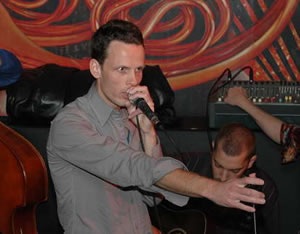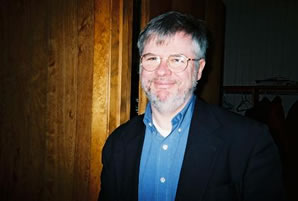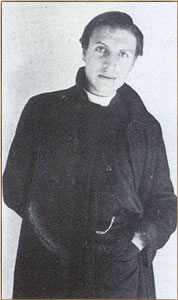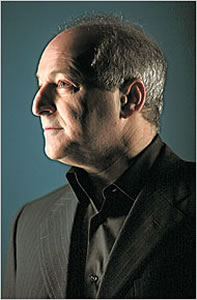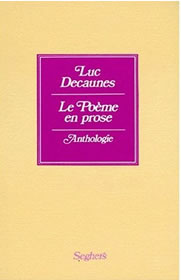De Amerikaanse toneelschrijver Christopher Durang werd geboren op 2 januari 1949 in Montclair, New Jersey. Zie ook mijn blog van 2 januari 2007 en ook mijn blog van 2 januari 2008.
Uit: ‘dentity Crisis
JANE. (at piano) I don’t remember taking piano lessons.
SUMMERS. Maybe you’ve repressed it. My wife gave me the message about your attempting suicide. Why did you do it, Jane?
JANE. I can’t stand it. My mother says she’s invented cheese and I start to think maybe she has. There’s a man living in th ehouse and I’m not sure whether he’s my brohter or my father or my grandfather. I can’t be sure of anything anymore.
SUMMERS. You’re talking quite rationally now. And your self-doubts are a sign of health. The truly crazy person never thinks he’s crazy. Now explain to me what led up to your attempted suicide.
JANE. Well, a few days ago I woke up and I heard this voice saying, “It wasn’t enough.”
SUMMERS. Did you recognize the voice?
JANE. Not at first. But then it started to come back to m e. When I was eight years old, someone brought me to a theatre with lots of other children. We had come to see a production of Peter Pan. And I remember something seemed wrong with the whole production, odd things kept happening. Like when the children would fly, the ropes would keep breaking and the actors would come thumping to the ground and they’d have to be carried off by the stagehands. There seemed to be an unlimited supply of understudies to take the children’s places, and then they’d fall to the ground. And then the crocodile that chases Captain Hook seemed to be a real crocodile, it wasn’t an actor, and at one point it fell off the stage, crushing several children in the front row.
SUMMERS. What happened to the children?
JANE. Several understudies came and took their places in the audience. And from scene to scene Wendy seemed to get fatter and fatter until finally by the second act she was immobile and had to be moved with a cart.
SUMMERS. Where does the voice fit in?
Christopher Durang (Montclair, 2 januari 1949)
De Nederlandse dichter, essayist, redenaar en literair-historicus Anton van Duinkerken werd op 2 januari 1903 geboren in Bergen op Zoom. Zie ook mijn blog van 2 januari 2007 en mijn blog van 26 december 2007 en ook mijn blog van 2 januari 2008.
Concentratiekamp
Niets dan de stem van een kind op den weg
Is genoeg om volkomen gevangen te zijn.
Achter het prikkeldraad wuiven de heesters,
Wat verder staan boomen en rein
In den lucht van den zomer klinkt eensklaps daarachter
Het heldere hooge geluid
Van ’t kind, dat plezier heeft, en ’t weet niet, hoe zeer het
Voor allen de vrijheid beduidt.
Dit lijkt op het heldere schellen der huisbel
Na schooltijd, als ’t Zaterdag is:
Dan komen de stoeiende vragen aan Vader
Waar morgen direct na de Mis
De wandeling heen gaat. Zij maken hun plannen;
Het huis is te klein voor ’t geluk,
En luid breekt de geestdrift der schoone verwachting
De ernst der studeerkamer stuk.
Wat baat het, van kind’ren en vrijheid te droomen,
Terwijl men toch vruchteloos tuurt
Om achter de heesters een glimp te betrappen
Van het leven? – Gevangenschap duurt
Niet korter, wanneer men zijn eigen geluk zoekt.
We zijn meer dan zeshonderd man.
Een kind op den weg heeft gelachen. Wij hoorden ’t
En elk werd er eenzamer van.
Anton van Duinkerken (2 januari 1903 – 27 juli 1968)
De Amerikaanse schrijver, essayist en literatuurwetenschapper André Aciman werd geboren op 2 januari 1951 in Alexandrië in Egypte. Zie ook mijn blog van 2 januari 2008.
Uit: Letters of Transit
“On a late spring morning in New York City almost two years ago, while walking on Broadway, I suddenly noticed that something terrible had happened to Straus Park. The small park, located just where Broadway intersects West End Avenue on West 106th Street, was being fenced off. A group of workers, wearing orange reflector shins, were manning all kinds of equipment, and next to what must have been some sort of portable comfort station was a large electrical generator. Straus Park was being dismantled, demolished.
Not that Straus Park was such a wonderful place to begin with. Its wooden benches were dirty, rotting, and perennially littered with pigeon droppings. You’d think twice before sitting, and if you did sit you’d want to leave immediately. It had also become a favorite hangout for the homeless, the drunk, a
nd the addicted. Over the years the old cobblestone pavement had turned into an undulating terrain of dents and bulges, mostly cracked, with missing pieces sporadically replaced by tar or cement, the whole thing blanketed by a deep, drab, dirty gray. Finally, the emptied basin of what used to be a fountain had turned into something resembling a septic sandbox. Unlike the fountains of Rome, this one, like the park itself, was a down-and-out affair. Never a drop flowed from it. The fountain had been turned off decades ago.“
André Aciman (Alexandrië, 2 januari 1951)
De Nederlandse dichter Nyk de Vries werd geboren in Noordbergum op 2 januari 1971. Hij schrijft zowel het Nederlands als het Fries. Ook is hij gitarist van de band Meindert Talma & the Negroes. In 2000 debuteerde Nyk de Vries met de roman ‘Rezineknyn’ bij uitgeverij Frysk en Frij en drie jaar later volgt de vertaling ‘Rozijnkonijn’ bij uitgeverij Passage. Het verhaal speelt zich voor een groot deel af in zijn geboortedorp. Samen met Meindert Talma was Nyk de Vries redacteur van het tijdschrift De Blauwe Fedde. In 2001 kwam hieruit een boek met interviews voort, getiteld ‘De Blauwe Fedde Yn Petear’ (vert. “De Blauwe Fedde in gesprek”): een bundeling van vijftien levensverhalen van eigenzinnige Friezen. In 2006 verscheen de eveneens Friestalige roman ‘Prospero’. In het Friese literaire tijdschrift Hjir publiceert Nyk de Vries al sinds 2003 zijn prozagedichten. Deze zijn opgenomen in ‘Motorman‘ dat in 2007 gelijktijdig in het Nederlands als in het Fries verscheen.
Harkema
Aanvankelijk gaf ze fooien van wel honderd dollar. Langzaam slonk het
bedrag. Haar ster was dalende, ze begreep het zelf ook en op een avond
liep ze alleen in de richting van de havens, hinkelend, net als vroeger op
school. In gepeins klom ze naar de nok van een enorme hijskraan, bijna
tachtig meter boven de dokken. Het was ontzettend gevaarlijk wat ze
deed, nog afgezien van de jeugdbendes in de straten. Maar ze glimlachte,
balancerend op de uiterste rand. Het clubhuis in Harkema, daar was het
pas gevaarlijk.
Nyk de Vries (Noordbergum, 2 januari 1971)
De Nederlandse dichter, tekstschrijver en uitgever Look J. Boden werd geboren in Vlaardingen op 2 januari 1974. Hij werd landelijk bekend als oprichter en uitgever van het literaire tijdschrift Renaissance. Van 1996-2002 was hij hiervan hoofdredacteur. In 2000 richtte hij de Stichting Renaissance op, die de uitgave van het tijdschrift verzorgde, en ook festivals en Landelijke Gedichtendag organiseerde. Als dichter timmert hij vanaf 1995 aan de weg. Hij publiceert onregelmatig in bloemlezingen en tijdschriften. In 2007 kwam zijn eerste dichtbundel uit.
Vrouw in blik
Het is genetisch bepaald
niet zuiver, maar als je
je nou eens voorstelde
dat vrouwen klinische
objecten waren
die je ingeblikt
of ingeseald
kon kopen
bij de
super
(Ingrediënten:
verstand, liefde
redelijkheid,
sex-appeal –
20% van de
Aanbevolen
Dagelijkse
Hoeveelheid –,
conserveermiddel:
poëzie, smaakmakers:
u en andere mannen.
Tenminste Vruchtbaar Tot:
Zie onderkant)
dan zou ik sex
met een vleesetende plant
overwegen.
Look J. Boden (Vlaardingen, 2 januari 1974)
De Vlaamse schrijver Isidoor Teirlinck werd geboren in Zegelsem op 2 januari 1851. Zie ook mijn blog van 2 januari 2008.
Uit: Arm Vlaanderen
“Des anderen daags, eenen zondag, terwijl nog eene halve duisternis over het dorpje hing en de klok, de eerste maal, luidde voor de vroegmis, had de vleeschhouwer Borseels van Walleghem, het verken van den smid Jan Vanderlaen gekocht en weggeleid. Te vergeefs deed moeder Vanderlaen opmerken, dat men des zondags niet verkoopen mocht – ’t was werken, zei ze. – Na Borseels’ vertrek had oom Veyt, met een gegrinnik, den koopprijs opgestreken.
Bedrukt zat de smid bij het spaarzame vuur in de keuken; hij wreef herhaalde malen over zijne kin en scheen diep na te denken. Nu stond hij recht, trad in de nevenliggende kamer, waar Trees, zijne vrouw, zich aankleedde en zich gereed maakte om naar de kerk te gaan.
Twijfelend ging hij vóor het venster staan, alhoewel er buiten niets te zien was. Eindelijk richtte hij zich tot zijne vrouw, die op hem niet lette, en sprak:
‘Trees… in al mijn ongeluk zou ik mij nog al schikken… wildet gij mij maar verstaan… wat kan men in een huishouden beter hebben dan eene goede overeenkomst.’
In eenvoudige bewoordingen, soms haperend evenwel, legde hij heur vóor oogen hoe gelukkig zij vroeger waren, – vroeger, toen ze steeds dezelfde gedachten, dezelfde wenschen hadden! Nu, dat ze elkander meer dan ooit zouden moeten sterken en steunen, was dit zóó niet meer! Wie had zijne vrouw zoo zeer veranderd? Ging alles vroeger niet veel beter? Waren ze dan niet eerlijk?
Eerlijk – dat was het geliefde woord van den smid.“
Isidoor Teirlinck (2 januari 1851 – 27 juni 1934)
De Oostenrijkse schrijver Gerhard Amanshauser werd geboren op 2 januari 1928 in Salzburg. Zie ook mijn blog van 2 januari 2007
Uit: Mansardenbuch
“DAS VERKEHRSPARADOX
Seit Jahrzehnten sehe ich im Winter, durch kahle Zweige hinabblickend, die Fahrzeuge, die im Lauf der Zeit einen kontinuierlichen Strom gebildet haben, dessen Lärm, wie Einstein bewiesen hat, nichts anderes bedeutet als das Sägen am eigenen Ast.
Schrödinger hat das Verkehrsparadox aufgestellt: *M=0, oder, in Worten: Die Summe aller Transportbewegungen ist gleich Null. Hat man zum Beispiel eine Straße mit Gegenverkehr, so heben die durchschnittlichen Verschiebungen, die einen positiv, die gegenläufigen negativ gerechnet, einander auf.
Nils Bohr hat gezeigt, daß zwar die Beschleunigungen zunehmen und die Entfernungen abnehmen – was sich in einer durchschnittlichen Steigerung der Antriebsenergie ausdrückt -, daß aber dadurch einzig und allein der Einsteinsche Lärm jährlich um 10 Dezibel zunimmt, während die Summe der Transporte invariant bleibt, nämlich Null.
Die Zunahme des Einsteinschen Lärms, den ich seit Jahrzehnten von meiner Mansarde aus messe, bedeutet eine Abnahme unserer Arbeitszeit am eigenen Ast.“

Gerhard Amanshauser (2 Januar 1928 – 2 September 2006)
De Franse schrijver, mysticus, Rozenkruiser en Martinist Paul Sédir (pseudoniem voor Yvon Le Loup) werd geboren op 2 januari 1871 in Dinan. Op zeer jonge leeftijd verhuisde het gezin van Bretagne naar Parijs. Zijn ouders hadden het materieel heel moeilijk. Dit had gevolgen voor de kleine Le Loup. Door ontbering had hij een verborgen tuberculose, brak hij een been en kreeg hij de ziekte van Pott. Als kind wilde hij herder worden. Hij schreef ooit een boek over de herdershond. Tussen 1894 en 1898 werden de eerste artikelen en de eerste werken van Sédir uitgegeven bij La Librairie du Merveilleux. Tussen 1894 et 1906, publiceerde Sédir ook de eerste vertalingen, in het Frans, van auteurs zoals Jacob Boehme, Gichtel, Jeanne Leade, William Law. Tevens publiceerde hij eigen werk waarin hij de resultaten van zijn opzoekingen uiteenzette. Sédir was altijd zeer voorzichtig wanneer hij sprak over het onzichtbare. Op een dag veranderde deze voorzichtigheid. Sédir had nog slechts één leer: houden van de medemens en dat gecombineerd met het zoeken naar het Rijk van God.
Uit: BLAISE PASCAL ou LE PHILOSOPHE MYSTIQUE
„Par un admirable effort soutenu au bras puissant de la sapience céleste, Pascal entre dans la sublime phalange des mystiques et s’y installe à l’une des premières places. On a dit que la France n’est pas un pays de mystiques. Quelle erreur ! Parce que nos mystiques ne furent jamais obscurs ou verbeux, — sans doute ? Faut-il rappeler saint Bernard, sainte Colette, sainte Jeanne de Matel, Marie Guyard, tant d’autres ? Faut-il souligner ce dix-septième siècle étonnant, qui ne se contente pas de rassembler les plus nobles artistes, mais qui nous offre encore, dans l’ordre religieux, parmi les plus célèbres entre un si grand nombre de mystiques également admirables, Vincent de Paul pour la réalisation extérieure, Corneille et Pascal pour la réalisation morale ? Le chauvinisme est une faiblesse; pourtant sachons rendre justice à notre pays ou, plutôt, adressons notre hommage à Dieu qui a comblé la France de Ses dons et qui ne lui a ménagé jamais ni les postes périlleux, ni les occasions de sacrifices, ni l’aide constante de Ses anges.“
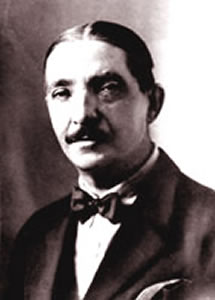
Paul Sédir (2 januari 1871 — 3 februari 1926)
De Bulgaarsse dichteres Blaga Nikolova Dimitrova werd geboren op 2 januari 1922 in Byala Slatina. Haar moeder was lerares en haar vader jurist. Zij groeide op in Veliko Tarnovo en verhuisde later naar Sofia, waar zij haar middelbare school afmaakte en ook tot 1945 Slavische filologie studeerde. In de jaren zeventig werd zij kritisch op de Bulgaarse overheid. Dat leidde ertoe dat vier van haar bundels niet uitgegeven konden worden in deze jaren. In de jaren 1992/1993 was zij echter korte tijd vice-president van haar land.
LULLABY FOR MY MOTHER
In the evening I smooth her sheets,
covered with deep wrinkles.
Her hand,
withered by giving,
pulls me towards the night.
Half asleep, barely able to speak,
she says in a childish voice,
so naturally,
“Mommy!”
I become my mother’s mother.
A cataclysm, a reversal
of the earth’s axis—
the poles flip over.
What was I doing? I don’t have time
for philosophical musings.
I dry her impatiently—
a skill, I’ve learnt from her.
“Mommy,” she whispers, guiltily,
remembering her naughtiness.
Cold air blows in the window.
The heating pad. The glass. The pills.
To adjust the lamp shade.
“Mommy, don’t go away!
I am afraid of the dark!”
Who is losing her mind, she or I?
Heavy with pain and fear, crying,
she waits for me to take her
in my arms. Two orphans cuddle
in the winter cradle.
Which am I?
Wake me up early tomorrow!
I am afraid, I’ll oversleep!
Dear Lord, is there something
I have forgotten?
Who will be late, she or I?
Mommy, my child, sleep!
Lullaby,
my baby . . .
Blaga Dimitrova (2 januari 1922 – 2 mei 2003)
De Amerikaanse dichter Philip Morin Freneau werd geboren op 2 januari 1752 in New York. Ten tijde van de Amerikaanse onafhankelijkheidsbeweging maakte hij met zijn patriotische gedichten naam als „dichter van de Amerikaanse revolutie.“ Terwijl tijdens zijn leven Freneaus politieke werd het meest in aanzien stond, zijn het nu gedichten als The Wild Honey Suckle, To a Caty-Did en The Indian Burying Ground die gelden als zijn belangrijkste bijdrage tot de literatuur. Zij tonen hem als een voorloper van de Amerikaanse Romantiek.
The Wild Honeysuckle
AIR flower, that dost so comely grow,
Hid in this silent, dull retreat,
Untouched thy honied blossoms blow,
Unseen thy little branches greet:
No roving foot shall crush thee here,
No busy hand provoke a tear.
By Nature’s self in white arrayed,
She bade thee shun the vulgar eye,
And planted here the guardian shade,
And sent soft waters murmuring by;
Thus quietly thy summer goes,
Thy days declining to repose.
Smit with those charms, that must decay,
I grieve to see your future doom;
They died–nor were those flowers more gay,
The flowers that did in Eden bloom;
Unpitying frosts and Autumn’s power
Shall leave no vestige of this flower.
From morning suns and evening dews
At first thy little being came;
If nothing once, you nothing lose,
For when you die you are the same;
The space between is but an hour,
The frail duration of flower.
Philip Freneau (2 januari 1752 – 18 december 1832)
De Franse schrijver Jean-Bernard Pouy werd geboren op 2 januari 1946 in Parijs. Na het gymnasium studeerde hij kunstgeschiedenis, met als zwaartepunt film. Daarna volgden allerlei werkzaamheden: als leraar, draaiboekschrijver, lector en journalsit. Zijn eerste boek „Spinoza encule Hegel“ verscheen in 1983. Het is een persiflage op de strubbelingen binnen de beweging van ‚68. Pouy’s hoofdfiguren zijn vaak oud-linksers. Zijn verhalen zijn doorspekt met boosaardige humor en bizarre invallen. Hij staat in de traditie van l’Oulipo.
Uit: LES TICS DE SPINOZA
„C‘est comme ça. II y a des noms qui s’imposent tout seuls, Rimbaud, Caravage ou Johnny Thunders. II en va de même si l’on veut labourer le champ philosophique. Où va se nicher la mythologie absurde qui nous est si chère ? Dans Héraclite ou Aristote ? Chez Merleau-Ponty et Heidegger ? Non. Dans ces exemples pris au hasard, aucune image idiote ne nous monte à l’esprit. C’est un jeu : si on mettait un peu de moteur dans la métaphysique, Hegel roulerait en Solex, Marx bloquerait les frontières en trente-huit tonnes, Kant conduirait un grosse Mercedes Diesel sièges en cuir.
Mais Spinoza, le bon Baruch, impossible de le voir autrement que figé cuir, tête dans le vent, au guidon d’une moto Guzzi rouge, mille centimètres cubes, flamboyante et lustrée. C’est ainsi. Ça ne s’explique pas, c’est de l’ordre du transcendant. Spinoza, ne me demandez surtout pas pourquoi, c’est beaucoup plus rock and roll que Deleuze. L’histoire de la philosophie, (épistémologie et autres équipes de seconde division, c’est comme le reste, ça comporte des seconds couteaux, des rôles annexes, de la figuration, quelquefois des gueules qu’on n’oublie pas. Les stars, ces cerveaux en roue libre qui impriment durablement le cortex liquide des générations, ont quelque chose en plus. Prenez Wittgenstein, qui adorait faire la vaisselle qui écrit sous les grenades dans une tranchée de la guerre de 14, comme Évariste Gallois, la nuit avant le duel fatidique. Très fort.“
Jean-Bernard Pouy (Parijs 2 januari 1946)
De Franse dichter en schrijver Luc Decaunes werd geboren op 2 januari 1913 in Marseille. Hij werkte voor de radio, als journalist en als organisator van festivals, maar is vooral bekend wegens zijn talrijke, sinds 1938 gepubliceerde, gedichtenbundels, romans en bloemlezingen. Hij was bevriend met dichters als Louis Aragon, Tristan Tzara en Paul Éluard.
Réponses
Le chardonneret dans son nid
L’hirondelle au bord de ses ailes
La goutte d’eau dans son nuage
Que sont-ils ? Que font-ils ?
Ils attendent le jour le temps du vol l’orage
Ils ont patience de sages
L’espace leur est promis.
— Mais le prisonnier dans sa tour
Mais le partisan dans son bagne
Mais l’homme seul au pied du mur ?
Quand les murs sont clos
Quand le ciel est vide
Quand les fleurs sont là au bout des fusils
Les fleurs bavardes de la mort implacable ?
— Ils attendent le jour le temps d’amour l’orage
Ils ont le cœur des camarades des amis
Les mains de ceux qui luttent à leur place
L’avenir leur est promis.
Luc Decaunes (2 januari 1913 – ? 2001)
Boekomslag (Geen portret beschikbaar)










